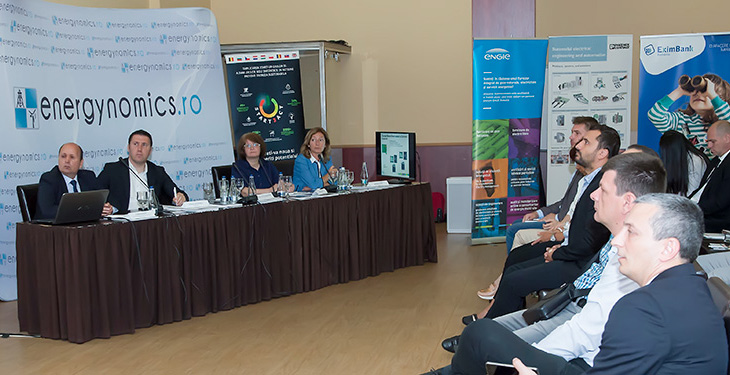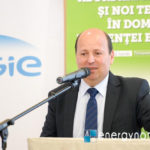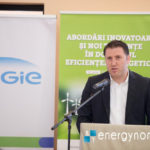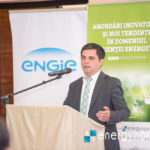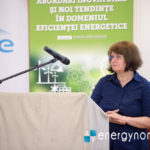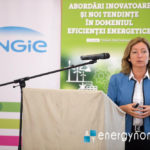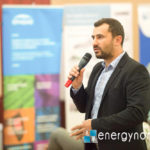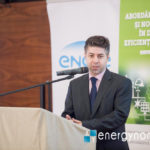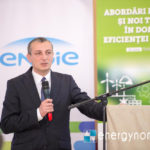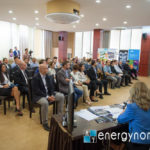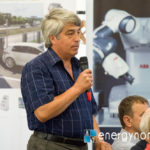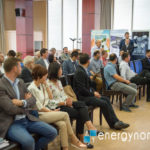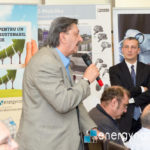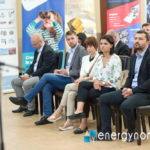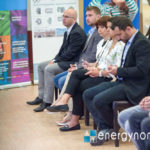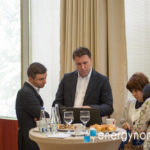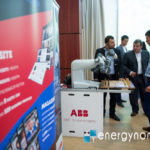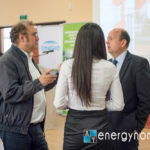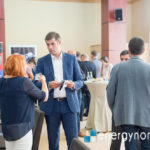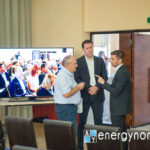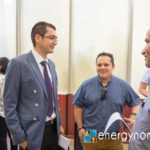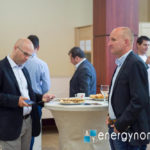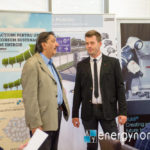A stronger pressure from companies to authorities could accelerate the adoption and implementation of clearer measures to support efforts for increased energy efficiency. For the time being, companies themselves need to identify funding solutions and to engage in partnerships in order to improve energy performance in their current activity. These were the reccurent points made in the speeches during the conference “Innovative approaches and new trends in energy efficiency”, organized by energynomics.ro on Thursday, June 22nd, the third of the information campaign “Energy efficiency for big results”.
More than 50 experts from Timişoara and neighboring localities participated in the debates that were stimulated by five leading speakers, representatives of ENGIE Romania, ABB România, Phoenix Contact, Enero and EximBank.
Extensive range of solutions and services from ENGIE Romania
Sorin Giurgiu, Head of the Business Customer Sales Department, ENGIE Romania presented in short the group’s intentions globally on three directions of development:
- Reduced CO2 emissions in electricity production
- Development and management of the global infrastructures and networks (gas and electricity)
- Solutions and services for residential clients, professional associations, companies, municipalities and other territorial units
“Decentralization means getting closer to the customer. For example, 20 years ago, when talking about energy, GWs and TWs were used as measuring units. Ten years ago, we have already reached MWs, and now we are talking about customized solutions at the level of kWs”, Sorin Giurgiu explained.
As part of the ENGIE group, one of the world’s leading energy companies, ENGIE Romania is an important local player with about 1,6 million customers and a turnover of nearly one billion euros. ENGIE Romania is the first natural gas importer in Romania and the first natural gas supplier on the regulated market, and Distrigaz Sud Retele is number one in the natural gas distribution in Romania. ENGIE Servicii is a market leader on the technical services segment with 650.000 customers.
MicroCHP for independence and energy efficiency
A product dedicated to the high energy consumption buildings (hotels, guesthouses, hospitals) and heat is the cogeneration micro-power plant for which ENGIE Romania can provide the initial investment through a F-BOOT (Finance-Built-Own-Operate-Transfer) type of agreement.
Given that half of the electricity invoice is represented by system tariffs (transport and distribution), this microCHP eliminates these costs. An additional element that contributes to cost reduction is the simultaneous production of electricity and heat even at the customer’s location, which gives him the opportunity to produce his own energy. “We responded to the customer’s request, which wanted to be more efficient and cost-effective”, explained Gabriel Florea. “After 9 years of operation, the equipment becomes for free the property of the customer, and the benefits already confirmed by the presented project are a lower fuel consumption, a lower environmental impact, and significant energy cost savings”.
Development, financing and operation for the compressed natural gas filling stations
In the next weeks, ENGIE Romania will inaugurate in Bucharest its first public filling station for fuelling vehicles with compressed natural gas (GNC), confirmed Sorin Giurgiu.
The company wishes to remain a player within the sustainable urban mobility and it will engage in the efforts for pollution reduction, by supporting the development of the GNC infrastructure. “Gas is a greener alternative to classic fuels, it is nontoxic, less corrosive and has a low degree of flammability. By compression, the volume of gas is reduced to 1% of the initial volume and this allows its use on all classes of motor vehicles”, explained the representative of ENGIE Romania. “We intend that after the launch of our first public station to gradually switch a part of our own vehicle fleet to compressed natural gas”, announced Giurgiu. “We are in advanced discussions with the authorities in several municipalities, including Constanta, Valcea, Braşov, in order to support programs for introducing buses for public transport fuelled by compressed natural gas.”
DOWNLOAD THE PRESENTATION OF SORIN GIURGIU
The ENGIE Romania representative also referred to the extensive consulting and services package for optimizing energy consumption, and also the SMCE application – which allows the customer to monitor and analyze energy consumption by energy types (natural gas or electricity) so that it would be able to intervene for consumption management and budget optimization.
Energy efficiency by automation and robotics
With 135.000 employees in 100 countries, as a global leader in energy and automation, ABB offers solutions to increase industrial productivity through four divisions:
- Energy networks
- Electrical and energy products
- Operation and automation
- Process automation
Ovidiu Albulescu, Country Service Manager şi Sales Manager Industry Segment la ABB România, exposed 10 reasons to invest in automation and robots. The ABB representative added that investments in industrial automation is recovered in two, up to five years, and the lifetime of a robot can reach 15-20 years with minimal maintenance costs, depending on the exploitation.
DOWNLOAD THE PRESENTATION OF OVIDIU ALBULESCU
The ABB Ability platform comes with digital solutions for the industry, segmented into three categories: utilities, production units, transport and infrastructure. In the case of utilities, the ABB representative mentioned the reduction in installation time (40%), maintenance costs (50%) and stop times (50%). “In the industry, the 180 solutions we implemented, show that we can achieve productivity growth (200%), reduced energy consumption (30%) and longer product lifetime (30%),” Albulescu said.
Electric Mobility Solutions from Phoenix Contact
Cătălin Marius Lepinzean, Business Development Manager at Phoenix Contact, mentioned two of the directions of action that the German group has in Romania. Founded in 1923, PHOENIX CONTACT Gmbh & Ko is a leader in the field of electrical component manufacturing and industrial automation technology, and in 1928 Phoenix Contact invented the terminal block (RWE clamp) for the German electricity company RWE. With 15,000 employees globally, the Phoenix Contact group has an annual turnover of two billion euros. “What Phoenix Contact proposes is this mix – starting from components, through integration of the solutions and implementing some ideas through appropriate technical solutions,” explained Cătălin Marius Lepinzean. Along with its partners, the company has implemented in Romania efficiency solutions in the production infrastructure, such as power conditioning, energy management, lighting control.
An important segment of the company’s activity is also electric mobility, an area which is not so developed in Romania, but which has great potential. “While we do not produce turn-key stations, we support system integrators in Romania to build such stations. We have fruitful collaborations with 4 or 5 companies, that is, we have already built and installed some stations,” Lepinzean said. Such companies, with the support of Phoenix Contact, offer integrated solutions – both the stations themselves and the networks and hardware / software architecture necessary for data transfer and complex network administration.
DOWNLOAD THE PRESENTATION OF CĂTĂLIN MARIUS LEPINZEAN
At present, the main beneficiaries are small or larger companies who want to install electric charghing stations in their car parks or other spaces they own: supermarkets, hotels, office buildings. Cătălin Marius Lepinzean also mentioned some plans for creating national networks of electric car charging stations.
ENERO – free support program for young SMEs
Nicoleta Ion presented the opportunities that SMEs and Start-ups in Romania have through the START2ACT, a project funded under the European Union’s research program Horizon 2020.
“A key area of intervention for increased energy efficiency through behavioral changes is represented by office equipment, which has the largest increase in energy consumption in the business area,” Nicoleta Ion explained. Office equipment consumes 15% of the total electricity used in offices, and the trend is that this share will increase to 30% by 2020. Even though SMEs are not yet subject to a legal obligation to conduct an energy audit once in 4 years, achieving energy savings through cost-effective or costless measures (behavioral changes) should be aknowledged as an asset for SME owners and managers.
DOWNLOAD THE PRESENTATION OF NICOLETA ION
ENERO is a consulting center based in Bucharest that can offer free assistance through a so-called “mentoring program”. The first visit is devoted to an assessment of energy consumption and translates into implementing fast, cost-free measures, Nicoleta Ion explained. The next two visits have the objective of identifying opportunities to reduce consumption through low-cost measures, and more costly measures, respectively.
Nicoleta Ion gave some examples of actions taken following these visits:
- assessment of the consumers and of the energy consumption
- consumption analysis based on invoices
- evaluation of the thermal insulation by thermal imaging
- recording consumption over a period of time
All start-ups younger than 5 years are eligible in this free program and they are encouraged to contact ENERO at start2act@enero.ro or nicoleta.ion@enero.ro.
Financing, guarantees and insurance from EximBank
Carmen Liptak, EximBank Regional Manager, presented how the bank is involved in supporting and promoting the Romanian business environment. “Like any other bank, we have in our portfolio products and banking services that can be accessed by any type of company, whether it is an SME or a large company, it carries out international transactions, or it only addresses the internal market”, Carmen Liptak said. In addition, EximBank offers for the commercial banks in the local market guarantees and state guarantees that facilitate the acceleration of lending to local firms, with a better risk coverage. “Because we are the only bank in Romania that acts as the state’s agent, we issue sovereign guarantees that reduce the risks associated with lending, thus facilitating the access of companies to financing,” the EximBank representative pointed out.
“We cover up to 80% of the bank guarantee letters to be issued by commercial banks for projects of infrastructure development, utilities, research and development, environmental protection, employment and training of staff, SME development etc,” also said the EximBank representative.
DOWNLOAD THE PRESENTATION OF CARMEN LIPTAK
She also presented the services for risk minimization, be it by providing commercial information about the activity of a potential business partner at home or abroad, which can be used for taking a collaboration decision, – or by the insurance package offered by EXIMASIG, the insurance company owned by EximBank..

Over 50 representatives from ABB România, ACS Politehnică Timișoara, AGASI, Automaton, Camera de Comerț, Industrie și Agricultură Timiș, Can&Power, CAPABIL, Delgaz Grid, EE Test, EETIM, Electroproiect HK, ENEL, Enero, ENGIE, ETA-2U, Euroelectric, EximBank, Heliopolis Energia, I.S. Intelltech, Intelligent Buildings, ISIM Timisoara , Luxten, Media.edu, Phoenix Contact, Prodez Vest, Renewables Consulting, RRA, Tectonics Art, UPT Timişoara attended the presentations and participated in discussions.
The event was organized by energynomics.ro and supported by our partners: ABB România, ENGIE România, EximBank, Phoenix Contact.
The Gold sponsor of the conference was ENGIE Romania, a company that, together with its subsidiaries, serves approximately 1.6 million customers, operates a network of 19,000 kilometers in 19 counties in Southern Romania and Bucharest.
